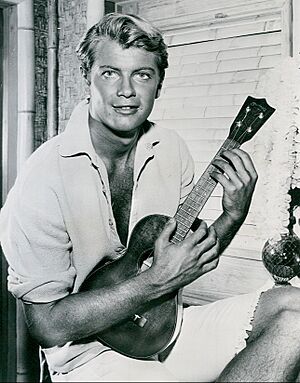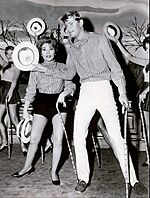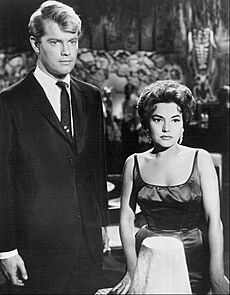Troy Donahue facts for kids
Quick facts for kids
Troy Donahue
|
|
|---|---|

Donahue in Hawaiian Eye, 1959
|
|
| Born |
Merle Johnson Jr.
January 27, 1936 New York City, U.S.
|
| Died | September 2, 2001 (aged 65) Santa Monica, California, U.S.
|
| Alma mater | Columbia University |
| Occupation |
|
| Years active | 1957–2000 |
| Spouse(s) |
|
| Partner(s) | Zheng Cao (1991–Donahue's death 2001, engaged from 1999) |
| Children | 2 |
Troy Donahue (born Merle Johnson Jr., January 27, 1936 – September 2, 2001) was an American actor. He was famous for his roles in movies and TV shows, especially as Johnny Hunter in the film A Summer Place. He was very popular in the 1950s and 1960s.
Contents
About Troy Donahue
His Early Life
Merle Johnson Jr., who later became Troy Donahue, was born on January 27, 1936, in New York City. His father, Frederick Merle Johnson, worked in making promotional films. His mother, Edith Johnson, was a retired stage actress from Sweden.
Troy always wanted to act. He said his mother helped him, but his parents wanted him to choose a more stable job. He remembered being around Broadway and theater people often.
When Troy was six, he got sick with pneumonia. His parents moved the family to a five-acre estate in Bayport, Long Island, for his recovery. They even had farm animals there. His sister, Eve, was born a year later.
Troy's father became ill and passed away on December 5, 1950, when Troy was 14 years old. After his father's death, Troy's relationship with his mother became difficult.
Troy left high school in his second year. His mother then sent him to the New York Military Academy. There, he met Francis Ford Coppola and cast him in school plays. Troy planned to go to West Point, but a knee injury stopped him. He tried to join the United States Army, but his knee injury meant he couldn't.
Since he couldn't play sports, Troy focused on writing and acting. He wrote for the school paper and became its editor. He finished school in June 1954.
When he was 18, Troy moved back to New York. He worked as a messenger for a film company his father had started. He also studied journalism at Columbia University. He acted in plays during the summer. Troy didn't have much money during this time.
He lost his job at the film company because he was too young to join the union. A family friend, Darrell Brady, offered him a job in Los Angeles. Troy moved to California in February 1956.
Starting His Acting Career (1956-1958)
In California, Troy worked cutting film. He later rented an apartment in Malibu.
One day, a producer and director saw Troy in a diner. They arranged a screen test for him with Columbia Pictures. Before the meeting, Troy had a car accident. He was badly hurt with cracked ribs, a bruised spine, and other injuries.
Later that year, Troy met actress Fran Bennett. She introduced him to her agent, Henry Willson, who also worked with Rock Hudson. Willson signed Troy and changed his name to Troy Donahue. Troy said it took him only five minutes to get used to his new name.
In October 1956, Troy signed a contract with Universal Studios. He started with small roles in films like Man Afraid and Man of a Thousand Faces (both 1957). In 1958, he appeared in Summer Love.
When his contract with Universal ended, Troy had little money. His agent helped him get guest roles in TV western shows. Troy appeared in shows like Man Without a Gun, The Californians, and Rawhide. He also had a small but notable part in the film Imitation of Life (1959).
Becoming a Star with Warner Bros. (1959-1964)
Troy Donahue's big break came when he starred with Sandra Dee in the 1959 Warner Bros. film A Summer Place. The movie was a huge hit at the box office. It made Troy a celebrity, especially among teenagers.
After this success, Warner Bros. signed him to a long-term contract in 1959. They sent him on a tour across the country to promote the film. He met reporters, appeared on radio and TV shows, and was featured in fan magazines. He became a symbol of teen stardom.
Troy also appeared in many Warner Bros. western TV series. These included Colt .45 (1959) and Maverick (1959). He also had a role in the disaster movie The Crowded Sky (1960).
In the early 1960s, Troy also tried singing. He released a few songs, but they did not become big hits.
Warner Bros. cast him in the TV series Surfside 6 (1960–62). This show made him a household name. His face was on many products, from posters to lunch boxes. After Surfside 6 ended, Troy joined Hawaiian Eye for its last season (1962–1963).
Troy reunited with Delmer Daves, the director of A Summer Place, for the film Parrish (1961). This movie was also a box office success. Troy felt this was one of his most satisfying roles. They made two more films together: Susan Slade (1961) and Rome Adventure (1962).
In 1962, Troy received thousands of fan letters each week. By 1963, he was voted the 20th most popular star in the US. He was also very popular in Japan. His final film for Warner Bros. was the 1964 western A Distant Trumpet.
After Warner Bros. (1965-1968)
In 1965, Troy starred in My Blood Runs Cold. He was happy to play a different kind of role. His contract with Warner Bros. ended soon after. Troy found it hard to get new acting jobs. He felt that the type of roles he was known for were no longer popular.
He appeared in smaller films like the spy spoof Come Spy with Me (1967). From 1966 to 1967, Troy toured with the play The Owl and the Pussycat.
In 1968, Troy signed a new contract with Universal Studios. He got guest roles in TV shows like Ironside (1968).
Troy faced financial difficulties during this time. He lost his home and sometimes slept at friends' houses. He said he lived like a movie star but wasn't paid like one. He found it hard to get roles because Hollywood was changing.
Later Career and The Godfather Part II (1969-2000)
In 1969, Troy moved to New York City. He appeared in the daytime TV show The Secret Storm for six months.
By 1971, Troy felt his old image made it hard to find work. He starred in some low-budget films, including Sweet Savior (1971) and Seizure (1974), which was Oliver Stone's first film as a director.
Troy's financial situation was very difficult. He sometimes relied on friends and fans for help. In 1974, his former classmate Francis Ford Coppola offered him a small role in The Godfather Part II. Troy's character was named Merle Johnson, which was Troy's real name. This role helped him financially.
After this, Troy returned to Los Angeles. He made occasional TV appearances on shows like Ellery Queen and CHiPs. He also appeared in commercials for Japanese television.
In 1982, after becoming sober, Aaron Spelling gave Troy a role in the TV series Matt Houston. He also appeared in the 1984 film Grandview, U.S.A..
In 1990, Troy appeared in John Waters' film Cry-Baby. In 1997, he toured in a production of Bye Bye Birdie. In 1998, he joined Sandra Dee for a special showing of A Summer Place.
Troy continued acting in films and TV shows through the 1980s and 1990s. However, he never reached the same level of fame he had in his early career. His last film role was in the 2000 comedy The Boys Behind the Desk.
Personal Life
His Children
In 1982, Troy learned he had a son named Sean. Sean was born in 1969 from a brief relationship Troy had. Troy said he saw a 13-year-old boy who looked just like him when he was young. Sean knew Troy was his father. Troy and Sean began to spend time together.
In 1987, Troy found out he had another child, a daughter named Janene Curtis. Janene was born in 1964 and was adopted. When she found her biological mother, she learned Troy was her father. Janene reached out to Troy, and they became close. They remained close until his death.
His Passing
On August 30, 2001, Troy Donahue had a heart attack. He was taken to a hospital in Santa Monica, California. He had surgery, but then had a second heart attack. He passed away on September 2, 2001, at the age of 65.
Music He Released
- Live Young (1963)
- Somebody Loves Me (1963)
Film Roles
| Year | Title | Role | Notes |
|---|---|---|---|
| 1957 | Man Afraid | Reporter | Uncredited |
| Man of a Thousand Faces | Assistant Director in Bullpen | Uncredited | |
| The Tarnished Angels | Frank Burnham | ||
| Flood Tide | Teenager at Beach | Uncredited | |
| The Monolith Monsters | Hank Jackson | Uncredited | |
| Summer Love | Sax Lewis | ||
| 1958 | Live Fast, Die Young | Artie Sanders / Artie Smith | |
| This Happy Feeling | Tony Manza | ||
| Wild Heritage | Jesse Bascomb | ||
| Voice in the Mirror | Paul Cunningham | ||
| The Perfect Furlough | Sgt. Nickles | ||
| Monster on the Campus | Jimmy Flanders | ||
| 1959 | Imitation of Life | Frankie | |
| A Summer Place | Johnny Hunter | ||
| 1960 | The Crowded Sky | McVey | |
| 1961 | Parrish | Parrish McLean | |
| Susan Slade | Hoyt Brecker | ||
| 1962 | Rome Adventure | Don Porter | |
| 1963 | Palm Springs Weekend | Jim Munroe | |
| 1964 | A Distant Trumpet | 2nd Lt. Matthew 'Matt' Hazard | |
| 1965 | My Blood Runs Cold | Ben Gunther | |
| 1967 | Come Spy with Me | Pete Barker | |
| Jules Verne's Rocket to the Moon | Gaylord | Also known as Those Fantastic Flying Fools | |
| 1970 | The Phantom Gunslinger | Bill | |
| 1971 | Sweet Savior | Moon | Also known as Frenetic Party |
| 1972 | The Last Stop | Sheriff | |
| 1974 | Seizure | Mark Frost | |
| Cockfighter | Randall Mansfield | ||
| South Seas | Steve | ||
| The Godfather: Part II | Merle Johnson | ||
| 1977 | The Legend of Frank Woods | Sheriff John Baxom | |
| Ultraje | Daniel | ||
| 1983 | Tin Man | Lester | |
| 1984 | Katy the Caterpillar | Chester | Voice, English-dubbed version |
| Grandview, U.S.A. | Donny Vinton | ||
| 1986 | Low Blow | John Templeton | Also known as The Last Fight to Win: The Bloody End |
| 1987 | Fight to Win | Rosenberg | Also known as Dangerous Passages or Eyes of the Dragon |
| Cyclone | Bob Jenkins | ||
| Hyôryu kyôshitsu | Taggart | English title: The Drifting Classroom | |
| Hollywood Cop | Lt. Maxwell | ||
| Deadly Prey | Don Michaelson | ||
| 1988 | Hawkeye | Mayor | Also known as Karate Cops |
| Hard Rock Nightmare | Uncle Gary | ||
| 1989 | Assault of the Party Nerds | Sid Witherspoon | Direct-to-video release |
| American Rampage | Police Psychiatrist | ||
| Dr. Alien | Dr. Ackerman | ||
| Terminal Force | Slim | ||
| Sounds of Silence | Larry Haughton | ||
| Bad Blood | Jack Barnes | ||
| Hot Times at Montclair High | Mr. Nichols | ||
| Blood Nasty | Barry Hefna | ||
| The Chilling | Dr. Miller | ||
| Deadly Spygames | Python | ||
| The Platinum Triangle | Harold Farber | ||
| 1990 | Click: The Calendar Girl Killer | Alan | |
| Cry-Baby | Hatchetface's Father | ||
| Omega Cop | Slim | ||
| 1991 | Shock 'Em Dead | Record Exec | |
| Deadly Diamonds | Matt Plimpton | Direct-to-video release | |
| 1992 | Double Trouble | Leonard | |
| The Pamela Principle | Troy | ||
| 1993 | Showdown | Police Captain | |
| 1998 | Merchants of Venus | FBI Agent | Also known as A Dirty Little Business |
| 2000 | The Boys Behind the Desk |
Television Roles
| Year | Title | Role | Notes |
|---|---|---|---|
| 1958 | Man Without a Gun | Jan | 1 episode |
| The Californians | Episode: "A Girl Named Sue" | ||
| 1959 | Rawhide | Buzz Travis | Episode: "Incident at Alabaster Plain" |
| Wagon Train | Ted Garner | Segment: "The Hunter Malloy Story" | |
| Tales of Wells Fargo | Cliff Smith | Episode: "The Rawhide Kid" | |
| Maverick | Dan Jamison | Episode: "Pappy" | |
| Sugarfoot | Ken Savage | Episode: "The Wild Bunch" | |
| Colt .45 | James 'Jim' Gibson | Episode: "The Hothead" | |
| Bronco | Roy Parrott Bart Bonner |
2 episodes | |
| The Alaskans | Ted Andrews | Episode: "Heart of Gold" | |
| 1960 | Lawman | David Manning | Episode: "The Payment" |
| 1960–1961 | 77 Sunset Strip | Star Bright Sandy Winfield I |
2 episodes |
| 1960–1962 | Surfside 6 | Sandy Winfield II | 71 episodes |
| 1962–1963 | Hawaiian Eye | Philip Barton | 26 episodes |
| 1965 | The Patty Duke Show | Dr. Morgan | Episode: "Operation: Tonsils" |
| 1968 | Ironside | Father Dugan | 2 episodes |
| The Name of the Game | Norman Hoak | Episode: "Nightmare" | |
| 1969 | The Virginian | Bracken | Episode: "Fox, Hound and the Widow McCloud" |
| The Lonely Profession | Julian Thatcher | Television movie | |
| 1970 | The Secret Storm | R.B. Keefer | |
| 1976 | Ellery Queen | Gilbert Mallory | Episode: "The Adventure of the Sinister Scenario" |
| 1977 | The Godfather Saga | Merle Johnson | Miniseries |
| 1978 | The Hardy Boys/Nancy Drew Mysteries | Alan Summerville | Episode: "Mystery on the Avalanche Express" |
| CHiPs | Bob Niles | Episode: "Peaks and Valleys" | |
| 1978 | Vega$ | Teddy Howard | Episode: "The Games Girls Play" |
| The Eddie Capra Mysteries | Duane | Episode: "Dying Declaration" | |
| 1978–1981 | Fantasy Island | Jack Terry Wallis Jaeger |
2 episodes |
| 1980 | Laverne and Shirley | Himself | 1 episode |
| The Love Boat | Mr. Clark | Episode: "Tell Her She's Great..." | |
| 1982 | Matt Houston | William 'Willie' Hoyt | Episode: "Joey's Here" |
| 1983 | Malibu | Clint Redman | Television movie |
| 1990 | Monsters | Dr. Thomas Becker | Episode: "Micro Minds" |
| 1998 | Legion | Flemming | Television movie |
| 1999 | Shake, Rattle and Roll: An American Love Story | Rob Kamen | Miniseries |
Box Office Popularity
- 1960: Voted 5th most likely star of Tomorrow
- 1961: 24th most popular star in the US
- 1963: 20th most popular star in the US
Theatre Performances
| Year | Title | Role | Director | Venue | Notes | Ref. |
|---|---|---|---|---|---|---|
| 1966-1967 | The Owl and the Pussycat | Felix | Philip Rose | Ivanhoe Theatre, Chicago | ||
| 1997 | Love Letters | Luke Yankee | Sacramento Theatre, Sacramento | |||
| 1998 | Bye Bye Birdie | Harry MacAfee | N/A | Tour |
Awards and Nominations
| Year | Award | Category | Nominated
Work |
Result | Ref. |
|---|---|---|---|---|---|
| 1960 | Golden | New Star of the Year - Actor | A Summer Place | Won | |
| Laurel Awards | Top Male New Personality | N/A | Nominated | ||
| 1962 | Photoplay Awards | Most Popular Male Star | N/A | Won |
See Also
 In Spanish: Troy Donahue para niños
In Spanish: Troy Donahue para niños
 | Selma Burke |
 | Pauline Powell Burns |
 | Frederick J. Brown |
 | Robert Blackburn |



